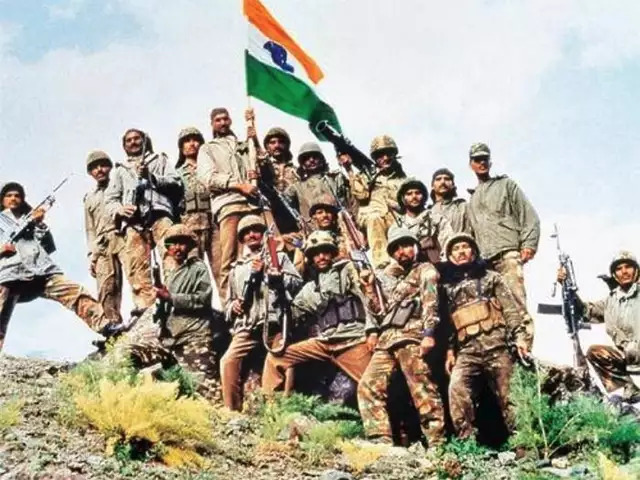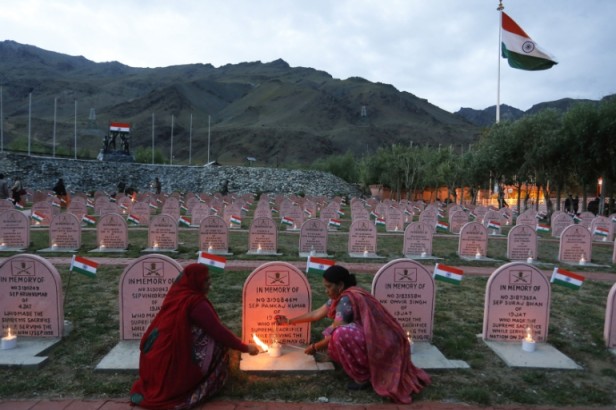Since war begets nothing but death and destruction, to say that it also brings out some good may appear paradoxical. Yet, despite the bestial behaviour displayed by Pakistan army during the Kargil war of 1999 that brazenly violated the fundamental principle of military ethics and international law, the exemplary professional conduct displayed by the Indian army was a reassuring relief, making it the good part of this war.
Continuing with the good part. As a thoroughbred professional military, the Indian army respects and appreciates exceptional valour even when it’s displayed by the enemy. Impressed by the extraordinary courage exhibited by Capt Karnal Sher Khan of Pakistan army who was killed while leading his men in a counter attack to recapture Tiger Hill, an Indian army Brigadier wrote a citation for Capt Khan’s act of valour and slipped it into the pocket of the deceased Capt before handing over his body to Pakistan army.
[Whether Pakistan army took any cognisance of the ‘citation’ written by the Indian Brigadier is not known, but Capt Karnal Sher Khan was awarded Nishan-e-Haider, Pakistan’s highest gallantry award].
The bad part of the Kargil war was that for the first time in the history of modern warfare, an army refused to accept the mortal remains of its own dead soldiers. However, the good part is that in keeping with the age-old code of military conduct, which prescribes that the enemy soldiers killed in combat deserve due dignity after death, the Indian army ensured that the abandoned dead bodies of Pakistan soldiers were buried with military honours and in accordance with prescribed Islamic rituals.
The ugly part of the Kargil war was the inhuman way in which Capt Saurab Kalia and his five team members, who were taken prisoners of war [POW] after they ran out of ammunition, were brutally tortured by the Pakistan army while in captivity and then shot dead. By claiming that Captain Kalia and his team had died due to extreme weather and their bodies were found in a pit, Pakistan may have thought that it could get out of a very messy situation. However, the presence of cigarette burns marks as well as perforated ear drums, gouged eyes, broken bones and amputated genitalia of the Indian army officer and his men unambiguously exposed the perverse barbarism of the Pakistan army.
Another ugly incident was the cold-blooded murder of Indian Air Force [IAF] pilot Sqn Ldr Ajay Ahuja who was forced to eject after his MIG 21 fighter aircraft was shot down by a surface-to-air missile. Pakistani authorities once again tried to conceal the barbarity of its soldiers by trying to peddle the lies that Sqn Ldr Ahuja may have been killed due to accidental injuries sustained while ejecting or as the result of a faulty landing.

However, the gunshot wounds to his head and chest tell an entirely different story and clearly indicate that a defenceless Sqn Ldr Ahuja had been shot either while he was parachuting or after he had landed. Since the post mortem examination also revealed that he had a fractured knee, Sqn Ldr Ahuja would have been incapacitated and unable to move after he hit the ground and as such it’s obvious that he wasn’t shot while making a getaway to evade apprehension!
Continuing with the ugly part of the Kargil War. Captain Haneef Uddin embraced martyrdom in Turtuk sector while leading his men in a daring assault on well-fortified positions occupied by Pakistani troops. Whereas military ethics call for expeditious return of the enemy dead, the Pakistan army took a perverse delight in preventing the extrication of his dead body by indiscriminately firing at those attempting to do so. Resultantly, his mortal remains could only be recovered after 43 days.
Though an extremely tragic occurrence, the good part is that this incident once again brings to the fore Indian army’s unconditional commitment and firm determination of bringing back its dead rank and file home. It also exhibits the grave concern of a bereaved mother as regards the safety of her martyred son’s comrades, which is both touching and inspiring. While the then Pakistan army chief Gen Pervez Musharraf had no qualms about disowning the dead bodies of his own soldiers, his Indian counterpart Gen VP Malik was so perturbed by the delay in retrieving the dead body of Capt Haneef that he personally went and met the martyr’s mother Mrs Hema Aziz.
As a mother, the very thought of her son’s dead body lying in the open and exposed to the elements would have certainly traumatised Ms Aziz, but this brave lady never expressed her anguish or complained. Au contraire, quoting from her interview with Ms Aziz, noted author Ms Rachna Bisht, that when Gen Malik told Capt Haneef’s mother that her son’s dead body couldn’t be retrieved because the enemy was firing constantly, “Mrs Hema Aziz told him that she did not want another soldier to risk his life to get her son’s body.”
Who says heroes only come in uniform!
Another good thing that happened during the Kargil War was that even though the Pakistan army did all it could to thwart extrication of Capt Haneef’s dead body, by doing just the opposite in Siachen Glacier where it had captured a Pakistani position known as ‘Bilal Post’, the Indian army demonstrated that it bore no grudge or discrimination against dead Pakistani army men. In this action, one Pakistan army officer named Capt Taimur Malik along with 10 soldiers were killed, but since Pakistan had refused to accept their dead bodies, all the deceased were buried in situ with military honours.
After the Kargil war ended, the aged grandfather of Late Captain Taimur Malik who was living in London, approached the Indian Defence Attaché there. Revealing that the deceased Captain’s father was also a former Pakistan army officer, he requested repatriation of his grandson’s mortal remains. The Indian army readily agreed, but on the condition that along with Captain Malik’s mortal remains, the Pakistan army should also accept all the other dead bodies of its soldiers killed on what is now renamed as ‘Navdeep Top’. Once this was accepted, the dead bodies were handed over to the Pakistan army.
So, in the final analysis, there can be no two views that during the Kargil War, the Indian army clearly emerged as the manifestation of ‘good’. On the other hand, by shamefully abandoning its own dead soldiers, doesn’t Pakistan army unambiguously signify all that is ‘bad’? Lastly, by subjecting Indian army POW in its custody to inhuman torture and indignity before killing them, as well murdering an incapacitated IAF pilot, hasn’t Pakistan army presented itself as personification of the ‘ugly’?

